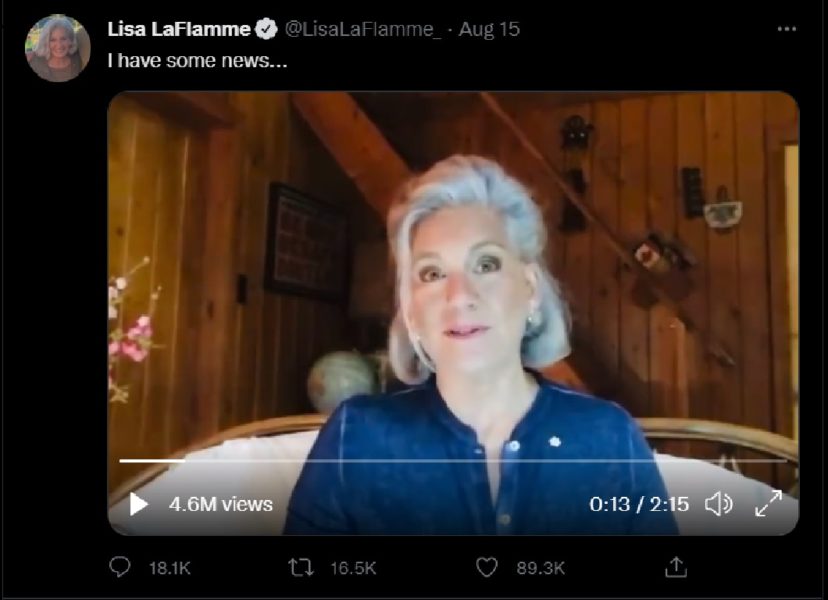Who should decide when a person retires or leaves their job?
Recently in the past couple of years, ageism has become more visible in the workforce. Ageism is discrimination against a person based on their age. It is most often towards older people and questions their ability to work well and keep up with new technology.
One primary industry where this happens is in media. In media, women who are on-screen and viewed all over the country are forced to meet a certain standard. Most times, they are to be attractive and young.
A few months ago, in June, a Canadian Chief news anchor and senior editor, Lisa LaFlamme, was released from her position. On June 29th, LaFlamme’s contract was ended, and later, she addressed the situation, saying she was “Blindsides, shocked and saddened.”
The reason behind the termination of LaFlamme’s contract was because of “changing viewer habits.” However, in a meeting, Michael Melling, who worked at CTV, where LaFlamme worked, exposed another reason. He questions who on the team let Lisa keep her hair grey. This comment sparked controversy over ageism, sexism, and firing workers because of signs of aging.

Because LaFlamme stopped coloring her hair, she was no longer fit for the screen. Interestingly enough, her predecessor Lloyd Robertson was 77 when he retired of his own will from CTV. However, Lisa LaFlamme was 58 when her contract was canceled. This difference shows that it is okay for men to age in media, while if a woman has grey hair and looks old, she is not what the audience wants. It is a prime example of older women dealing with discrimination about their age.
CTV has addressed this issue and is ensuring social injustices stop within their company. However, this situation brought to light a topic that may worry older workers.
It is ultimately up to the company to decide who they see as fit for the job. In most cases, when a contract is canceled, it is because one person in the agreement cannot perform the way they agreed to or has done something to go against the company.
Unlike what happened in LaFlammel’s case, it would be best if the company could sit down and talk to the person of interest. There are other ways to approach the situation instead of going behind their employee’s backs. A discussion should be held about the employee’s work ethic, quality of work, and how well it gets done. These things should be looked at instead of age or appearance. Terminating a contract should be done in a way that respects both parties.
In addition, while talking with the employee, there should be a warning system that leads to the end of a contract. This will enable the employee to understand why it is happening and to see how they could improve. If there is no reason given, and an employee is fired without warning, it seems like there is an ulterior motive.
If the company decides an employee is not performing their job as desired, then the company should be allowed to terminate that person. Businesses have the right to hire and fire who they want.
However, that is not what went down for LaFlamme. Many businesses that deal with media only care about their image. In today’s world, technology is changing every day, people are dictating beauty standards on T.V., and money is being made off of people’s insecurities. With such toxic influences, people will suffer from this type of society.
While companies should be able to fire and hire whoever they want, employees should be able to give input on their situations. The person of interest deserves to have their thoughts and opinions considered because they are the person it is concerning.
In support of LaFlamme, many brands took to social media. Wendys, Dove Canada, and more stood with LaFlamme, turning their logos grey and donating money towards organizations helping women.

It is a fine line between who should be able to do what. When two parties are involved, and contracts are signed, there is little room for unplaceable fault. Either the employee has done something to initiate the termination, or the company no longer wants that person working for them. Either of those opinions is a valid reason for a company to end a contract. Employees who are unhappy at their job have the right to resign or see if other options are available.
The main issue with the event of Lisa LaFlamme’s contract ending is that she seemed unaware of it taking place and enjoyed her job. The reason behind her termination seems unclear and unfair according to the ages and work done by other employees.
The issue of ageism in media is finally becoming a topic of conversation. Workers should be judged on their quality of work and ability to enhance the company, not on appearance and age.
Image source LaFlamme social media









